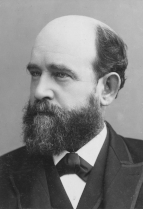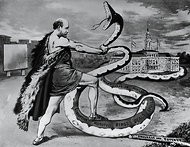I take issue with the final sentence in the below New York Times op-ed. Not only did Georgism account for greed, it was essentially designed as a system to dampen or ameliorate greed, which I would think means the desire (and collection) of more wealth than one deserves.
Greed, in economics, is almost synonymous with rent-seeking. Georgism neutralizes rent seeking (provided new forms of rent are identified and taxed as the greedy invent them). As long as assessment is accurate, greed becomes very difficult to act upon.
Greed is left to satisfy itself through such avenues as productivity or cleverness, rather than rent-seeking (which is essentially theft). And the productivity or other economic advances thus powered by greed will help the general welfare, in the way that the neo-cons already think any kind of economic growth does. (Obviously we know that a rising tide won't lift all boats, when 99% of the boats are firmly tied at anchor).
I hate that last sentence. It implies that Georgism is utopian, like communism or neo-conservatism/libertarianism/objectivism (or Zeitgeist) which are all based on assuming that humans will either subborn their greed in a fair system, or that selfish greed, individually expressed without limit, will somehow make things better for (almost) everyone. The inherent unfairness in our economic system isn't due to greed, but to the fact that we have essentially surrendered to the greedy so long as we don't capture economic rent for the public weal.
Erich Jacoby-Hawkins, Barrie, Ontario
----------
New York Times Op-ed
http://www.nytimes.com/2011/10/16/opinion/sunday/heres-the-guy-who-inve…
.... Henry George, the most popular American economic thinker of the 19th century, was a populist before populism had a name. His economic plan was known as the Single Tax. His plan wasn’t 9-9-9; it was just: 1.
George was born in Philadelphia in 1839. He left school at 14 to sail to India and Australia on board a ship called the Hindoo. At the time, a lot of people were writing about India as a place of jewels and romance; George was struck by its poverty.
Returning to Philadelphia, he became a printer’s apprentice. He went to New York where he saw, for the first time, “the shocking contrast between monstrous wealth and debasing want.” In 1858, he joined the crew of a ship sailing around the Cape Horn because it was the only way he could afford to get to California. In San Francisco, he edited a newspaper; it soon failed. He spent most of his life editing newspapers, and, as with every other industry in the 19th century, many of them failed. In 1865, George was reduced to begging in the streets.
The 19th century was the Age of Progress: the steam engine, the power loom, the railroad. (Awestruck wonder at progress animated that era the way the obsession with innovation animates American politics today.) George believed that the other side of progress was poverty. The railroad crossed the continent in 1869. From the West, George wrote an essay called “What the Railroad Will Bring Us.” His answer: the rich will get richer and the poor will get poorer. In a Fourth of July oration in 1877, George declared, “no nation can be freer than its most oppressed, richer than its poorest, wiser than its most ignorant.”
In 1879, George finished a draft of his most important book. “Discovery upon discovery, and invention after invention, have neither lessened the toil of those who most need respite, nor brought plenty to the poor,” George wrote. He thought the solution was to abolish all taxes on labor and instead impose a single tax, on land. He sent the manuscript to New York. When no one would publish it, he set the type himself and begged publishers simply to ink his plates. The book, “Progress and Poverty,” sold three million copies.
George was neither a socialist nor a communist; he influenced Tolstoy but he disagreed with Marx. He saw himself as defending “the Republicanism of Jefferson and the Democracy of Jackson.” He had a bit of Melville in him (the sailor) and some of Thoreau (“We do not ride on the railroad,” Thoreau wrote from Walden. “It rides upon us.”) But, really, he was a Tocquevillian. Tocqueville believed that democracy in America was made possible by economic equality: people with equal estates will eventually fight for, and win, equal political rights. George agreed. But he thought that speculative, industrial capitalism was destroying democracy by making economic equality impossible. A land tax would solve all.
In 1886, George decided to run for mayor of New York. Democrats urged him not to, telling him he had no chance and would only raise hell. “You have relieved me of embarrassment,” George answered. “I do not want the responsibility and the work of the office of the Mayor of New York, but I do want to raise hell.” The Democrat, Abram Hewitt, won, but George got more votes than the Republican, Theodore Roosevelt.
In the 1880s, George campaigned for the single tax, free trade and ballot reform. The last succeeded. George is why, on Election Day, your polling place supplies you with a ballot that you mark in secret. This is known as an Australian ballot, and George brought it back from his voyage halfway around the world.
George ran for mayor of New York again in 1897 but died in his bed four days before the election. His body lay in state at Grand Central. More than 100,000 mourners came to pay their respects. The New York Times said, “Not even Lincoln had a more glorious death.” And then: he was left behind.
Even Clarence Darrow, who admired him, recanted. “The error I found in the philosophy of Henry George,” Darrow wrote, “was its cocksureness, its simplicity, and the small value that it placed on the selfish motives of men.”
The economist hadn’t accounted for greed.

